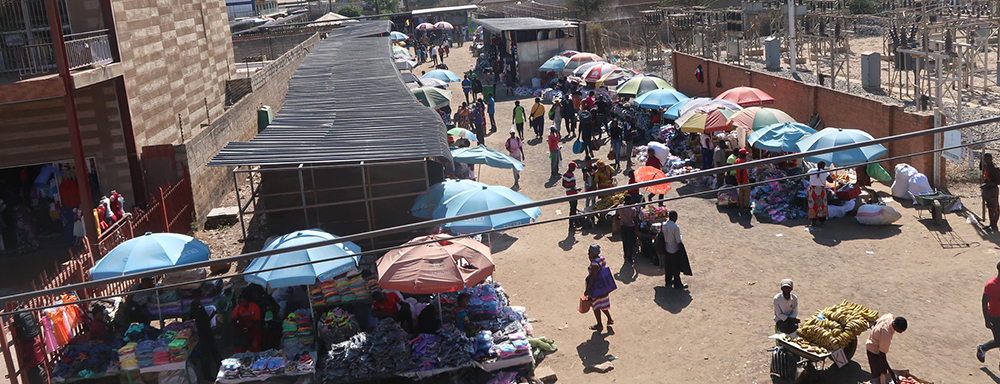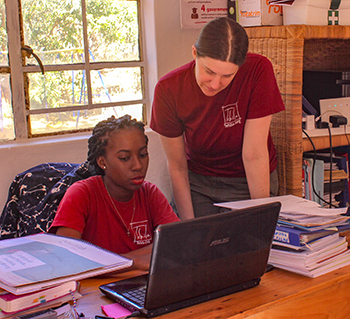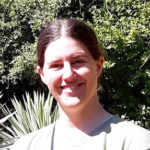Marabeth Madsen, from the USA, reflects on life in Zambia and describes how she is supporting Viva’s partner network as part of her Master’s placement.
Black smoke belching from construction trucks and crowded mini-bus taxis. Trees being cleared for road expansions. People standing between lanes at rush-hour selling just about anything they can buy cheaply and sell from one car-window to the next.
These were my first sights as I arrived in Zambia’s capital city, Lusaka. As I looked deeper, I saw signs of wealth in the large fancy hotels and casinos, high-end dining establishments, and numerous shopping malls (which I’m learning are the best landmarks to understand the geography of the city).
I saw signs of poverty in the disrepair of people’s hardworking bicycles hauling loads of lumber, charcoal, or thatch-like pick-up trucks; numerous partially constructed cinderblock homes (many inhabited without water or power); dusty children walking the streets when school is in session; and young people accompanying their parents to work in the markets on weekends.
People are really friendly here. I enjoy greeting and chatting with people I pass as I am walking to and from my internship each day. This is quite refreshing compared to America where most people seem afraid to talk to one another.

The situation for children in Lusaka is mixed. Throngs of children in uniforms walk back and forth to school and most seem to have enough to eat.
One of my first tasks was to research and deliver a presentation on child marriage to 50 sixth graders at an international school. I was very impressed by their enthusiastic engagement, intelligent questions, and commitment to social justice.
However, I also see many children in the streets downtown that are addicted to drugs and live by begging and sleeping outside. There are some children in the neighbourhood I travel through on the way to my internship who live in a partially-constructed house and do not seem to go to school.
They always wave to me with big smiles (“mzungu!”) And I wave back, wishing there was more I could do for them.

I am greatly enjoying the opportunity to complete my placement at a Christian organization (or ‘organisation’, as I am learning it’s spelled in British English…).
In America, most social work is secular. The US declaration of independence emphasises religious freedom, including the separation of church and state.
I attend a public university in the US, so, while social work has deep roots in the Church and students sometimes bring up their faith in classroom discussions, social work as a field feels largely secular at home today.
I feel refreshed by my co-workers’ faith and the comfort they draw from biblical teachings in the emotionally challenging field of child safeguarding.
At the Samalani Children At Risk Network (SCAR), we begin our day in the office with devotions at 8am, discussing whichever scripture is most alive in the minds of one of the teammates, then praying for God’s guidance throughout the day’s activities.
 I support the team in various ways. One day I might travel to a local neighbourhood to assist with the children’s discipleship programme for teens-at-risk. Sometimes I make phone calls to ensure the Good Treatment Campaign planning is on track in each of the six platforms that are hosting this year.
I support the team in various ways. One day I might travel to a local neighbourhood to assist with the children’s discipleship programme for teens-at-risk. Sometimes I make phone calls to ensure the Good Treatment Campaign planning is on track in each of the six platforms that are hosting this year.
On other days I review volunteer applications. I also make sure the database and google calendar are up to date so the directors can keep up with upcoming training sessions and events while they are travelling.
As a capstone for my placement, I will write a paper summing up my experience with the network. My working title is currently ‘A Myriad of Tasks’.

The discipleship programme especially interests me. It is geared towards at-risk teens who may otherwise be overlooked during a challenging phase of their development.
My co-worker, Lauren, and I led team-building games and encouraged the children to use art to reflect on how God loves them and how special they are.
I love working with teens because they are at such an impressionable age. They don’t want to admit it, but one sentence of encouragement or guidance from a trusted adult can reshape their whole trajectory in life.
I am a highly empathetic person, so child protection was one aspect of social work that intimidated me as I embarked on this career path.
I am a survivor of childhood sexual trauma, so I wondered how this field placement might affect me. I also wondered if my personal experience would be a source of bias, or if the healing work I have done over the years might offer a source of strength and hope to others.
Fortunately, I have found more strength than challenge.
 SCAR’s primary focus is on community capacity building through training and strengthening churches that work to improve child safety in Zambia.
SCAR’s primary focus is on community capacity building through training and strengthening churches that work to improve child safety in Zambia.
One thing I admire is how churches and community organisations are working together to host Viva’s initiatives like the World Weekend of Prayer and the Good Treatment Campaign.
Our evaluation feedback from each platform for the WWP said collaborations are happening that would not have taken place otherwise. I find this very encouraging.
I look forward to returning to the US with new community-organising skills and a deeper understanding of child safeguarding work in a global context.
 Marabeth Madsen is undertaking a Master’s in Social Work at the University of Michigan, and spending three-and-half months in Lusaka, Zambia for her Global Field Placement, supporting the work of Viva’s partner network, SCAR.
Marabeth Madsen is undertaking a Master’s in Social Work at the University of Michigan, and spending three-and-half months in Lusaka, Zambia for her Global Field Placement, supporting the work of Viva’s partner network, SCAR.
Photos: Curtis Lungu; Winnie Mwape; David McClain

